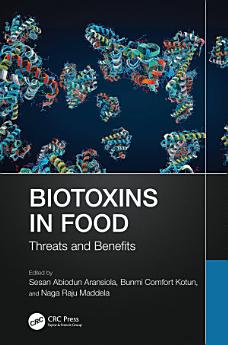Biotoxins in Food: Threats and Benefits
Rreth këtij libri elektronik
Key Features:
- Discusses the emerging concepts of types, sources, and distribution of biotoxins in food
- Addresses the prevalence and applications of biotoxins in food products
- Analyzes the current detection technology of biotoxins in foods
Rreth autorit
Sesan Abiodun Aransiola is a Ph.D holder in Environmental Microbiology in the Department of Microbiology, Federal University of Technology, Minna, Nigeria. He obtained his first degree (B.Tech) and Master Degree (M.Tech) from the same department in 2009 and 2014 respectively. He has demonstrated his research expert in the production of vermicasts from vermicoposting (Vermitechnology) of organic wastes to assist plants in the remediation of polluted soil with heavy metals. Currently, he is a Lecturer at the Department of Microbiology, University of Abuja, Nigeria. His area of interest is Environmental Microbiology with research area in phytoremediation, vermicomposting, biosorption and bioremediation of soil contaminated environment. He is an award-winning researcher and has over 80 publications including book chapters, research and review articles of good international repute with high impact factor. He has co-edited scientific books of global interest which include microbial biotechnology for bioenergy (Elsevier). Ecological interplays in microbial enzymology, prospects for soil regeneration and its impact on environmental protection (Springer). Microbial biofilms – applications and control, marine greens: environmental, agricultural, industrial and biomedical applications, Emerging Contaminants in Food and Food Products, Phytoremediation in Food Safety: Risks and Prospects (CRC Press) with many more in the process. Also, has worked to the rank of an assistant chief scientific officer at Bioresources Development Centre, National Biotechnology Research and Development Agency, Nigeria where he was involved in the uses of vinasse (a by-product of ethanol) as bio-fertilizer to reclaim polluted soil for agricultural purposes. Abiodun is a member of Nigerian Society for Microbiology and American Society for Microbiology among others.
Bunmi Comfort Kotun is a graduate of Microbiology (B.Sc.) University of Lagos, Akoka, Nigeria in 2004, had her Master’s degree (M.Sc.) Food Microbiology in 2008 and obtained her (Ph.D.) food Mycology in 2017 both from the University of Ibadan, Ibadan, Oyo state, Nigeria. Her Ph.D. research was focused on investigating the presence of toxigenic mould present in sampled Millet grains from the South Western states of Nigeria. Bunmi is presently with Caleb University, Imota, Lagos Nigeria, as a lecturer in the Department of Biological Sciences and Biotechnology. She is an upcoming researcher with book chapters and publications in scientific conferences and Journals. Her research interest is in Food Microbiology and has covered areas which includes, Mycology, Mycotoxicology, Food safety, Molecular characterization, Microbial related researches. She is a member of the Nigerian society for Microbiology, Mycology Society and also member Mycotoxicology Society of Nigeria.
Naga Raju Maddela received his M.Sc. (1996–1998) and Ph.D. (2012) in Microbiology from Sri Krishnadevaraya University, Anantapuramu, India. During his doctoral program in the area of Environmental Microbiology, he investigated the effects of industrial effluents/insecticides on soil microorganisms and their biological activities and he is working as Faculty in Microbiology since 1998, teaching undergraduate and postgraduate students. He worked on Prometeo Investigator (fellowship received from SENESCYT) at Universidad Estatal Amazónica, Ecuador during 2013-15, received "Postdoctoral Fellowship" (2016–2018) from Sun Yat-sen University, China. He also received external funding from "China Postdoctoral Science Foundation" in 2017, internal funding from "Universidad Técnica de Manabí" in 2020. He participated in national / international conferences, and presented research data in China, Cuba, Ecuador, India and Singapore. Currently, he is working as a Full Professor at the Facultad de Ciencias de la Salud, Universidad Técnica de Manabí, Portoviejo, Ecuador. He has been actively publishing scientific articles, books (authored and edited) and chapters since 2007. As of now, he published 105 articles, 22 books and 50 book chapters.





